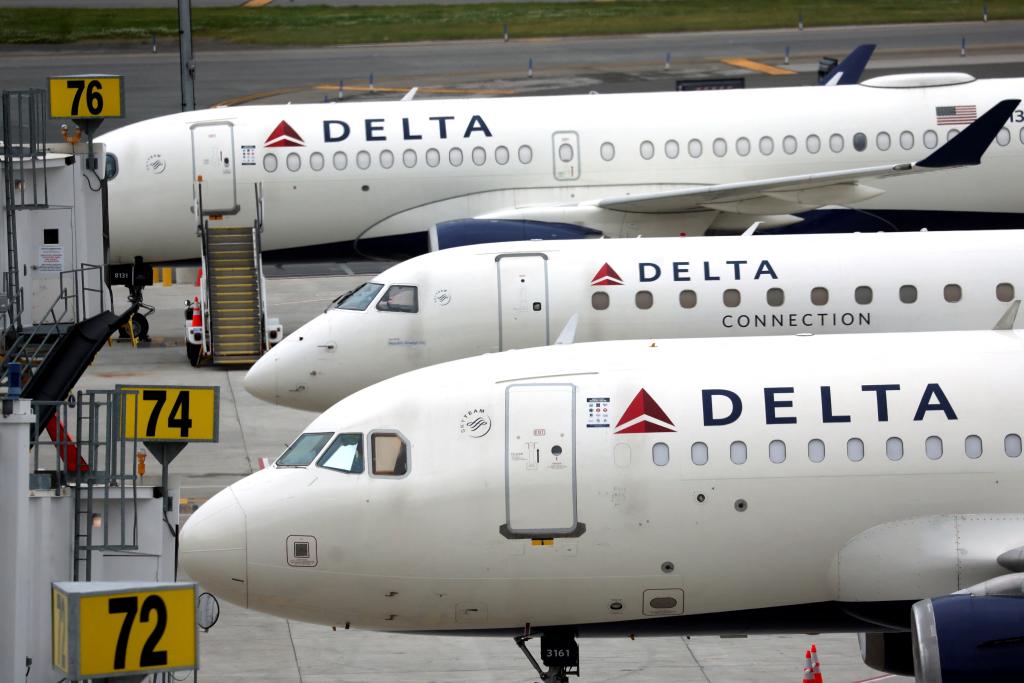Delta Air Lines becomes the first major US carrier to report a downturn in domestic travel, citing corporate pullbacks and consumer uncertainty as key factors behind the revised outlook.
In a stark reflection of the shifting economic landscape, Delta Air Lines revealed a significant downward revision of its first-quarter profit estimates on Monday, causing its stock to plummet by 14%. The Atlanta-based airline, a bellwether for the industry, became the first major US carrier to acknowledge the mounting pressure on domestic travel, driven by growing economic concerns and decreasing consumer and corporate confidence.
A Weakened Economic Environment
Delta’s CEO, Ed Bastian, did not mince words during his announcement, pointing to a combination of uncertainty, corporate pullbacks, and inflationary pressures as the primary culprits behind the airline’s revised outlook. “We saw companies start to pull back. Corporate spending started to stall,” Bastian told CNBC, emphasizing that consumers in discretionary sectors are particularly sensitive to economic instability.
The airline now expects a profit of between 30 and 50 cents per share, down sharply from the previous projection of 70 cents to $1, which had been made only two months earlier. While analysts had anticipated a reduction, the severity of the downgrade caught many by surprise.

The Ripple Effect Across the Industry
Delta’s warning sent shockwaves through the airline sector, contributing to a broader market selloff in airline stocks. United Airlines and American Airlines saw their shares fall by 11% and 9%, respectively, in after-hours trading. Overall, the S&P 500 passenger airlines index dropped 22% in the past month, significantly outperforming the broader S&P 500’s 7.5% decline.
This news comes amid rising concerns over tariffs imposed by President Trump, including the threat of additional levies, which have added to consumer uncertainty. Coupled with the fact that government spending cuts have already started affecting carriers’ revenue streams, the turbulence in the airline industry seems likely to persist.
The Broader Economic Picture
Delta’s outlook revision underscores the deepening concerns about the US economy. Consumer and business confidence have been impacted by ongoing trade tensions, particularly with China, and the possibility of a US economic contraction. The Atlanta Federal Reserve’s GDPNow tracker suggests that the economy could shrink in the first quarter of the year, which would further dampen economic activity and, by extension, demand for air travel.
In addition to the economic slowdown, the airline industry has been grappling with the impacts of a broader economic “soft patch,” as noted by analysts at Deutsche Bank. A contraction in government spending has already made a noticeable dent in carriers’ earnings, and the ongoing uncertainty about trade policies and tariffs has left many questioning the viability of aggressive growth plans for the airlines in the near term.
Delta’s Customer Base No Longer Immune
For years, Delta’s more affluent and diversified customer base had been touted as one of its greatest advantages, insulating it from some of the more volatile swings in travel demand. However, the airline is now reporting softness in bookings from key sectors such as aerospace and defense, autos, media, entertainment, and technology—industries that had previously been a consistent source of demand.
This is a concerning development, as corporate travel historically represents a significant portion of airline revenue. When companies pull back on travel budgets, it not only impacts revenue directly but also signals a broader slowdown in business activity, further stoking fears of a potential recession.
Outlook for the Industry
Analysts are now revising their forecasts for the airline sector, with several carriers likely to follow Delta’s lead in adjusting their profit expectations. In particular, Seaport Research Partners recently downgraded its 2025 pre-tax profit estimates for Delta, United, American, and Southwest Airlines, cautioning that the airlines have not fully accounted for the possibility of a full-blown trade war or significant cuts to government spending in their long-term outlooks.
As the airline industry braces for potentially more bad news, investors will be closely monitoring any updates from other major carriers during this week’s JPMorgan industry conference. With uncertainty prevailing across the US economy, the immediate future for Delta and its competitors remains clouded.
Conclusion
Delta’s decision to slash its profit forecast highlights the fragile state of both the airline industry and the broader economy. While the company’s more diversified customer base and robust international presence may help mitigate some of the damage, it’s clear that economic uncertainty is taking its toll on domestic travel demand. As the industry faces potential headwinds, all eyes will be on upcoming earnings reports and forecasts to gauge the true extent of the impact of this economic “soft patch.”












